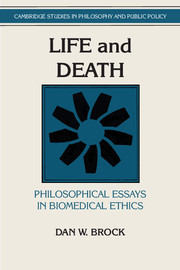Book contents
- Frontmatter
- Contents
- Sources and acknowledgments
- Introduction
- PART I PHYSICIANS AND PATIENTS MAKING TREATMENT DECISIONS
- 1 Informed consent
- 2 The ideal of shared decision making between physicians and patients
- 3 When competent patients make irrational choices
- PART II LIFE-AND-DEATH DECISIONS IN THE CLINIC
- PART III LIFE-AND-DEATH DECISIONS IN HEALTH POLICY
- Index
1 - Informed consent
Published online by Cambridge University Press: 05 June 2012
- Frontmatter
- Contents
- Sources and acknowledgments
- Introduction
- PART I PHYSICIANS AND PATIENTS MAKING TREATMENT DECISIONS
- 1 Informed consent
- 2 The ideal of shared decision making between physicians and patients
- 3 When competent patients make irrational choices
- PART II LIFE-AND-DEATH DECISIONS IN THE CLINIC
- PART III LIFE-AND-DEATH DECISIONS IN HEALTH POLICY
- Index
Summary
The two central aims of the requirement that medical care cannot be given to competent patients without their informed consent are illustrated by the following two cases, in which that requirement is violated.
Case 1. Dr. Smith diagnoses his patient, Mrs. Jones, as having breast cancer. He informs her that a radical mastectomy should be performed as soon as possible, brushes aside her timid attempts to discuss the matter further, and with her silent and grudging acquiescence books her in the hospital for surgery.
Case 2. Mr. Brown is suffering multiple complications and disability, principally from advanced diabetes and renal failure. He has had both legs amputated above the knee and is functionally blind. He is not considered a candidate for a kidney transplant and so faces the necessity of dialysis treatments for the rest of his life. He is mentally alert, has had his medical situation fully explained to him by his attending physicians, and seems to understand his situation well. Two weeks ago, he decided that he wanted no more painful dialysis treatments, knowing that their termination would quickly lead to his death, and he has remained steadfast in that decision since. Despite his decision, his physician refuses to stop the dialysis treatments, believing that to do so would be tantamount to killing his patient.
- Type
- Chapter
- Information
- Life and DeathPhilosophical Essays in Biomedical Ethics, pp. 21 - 54Publisher: Cambridge University PressPrint publication year: 1993
- 2
- Cited by



